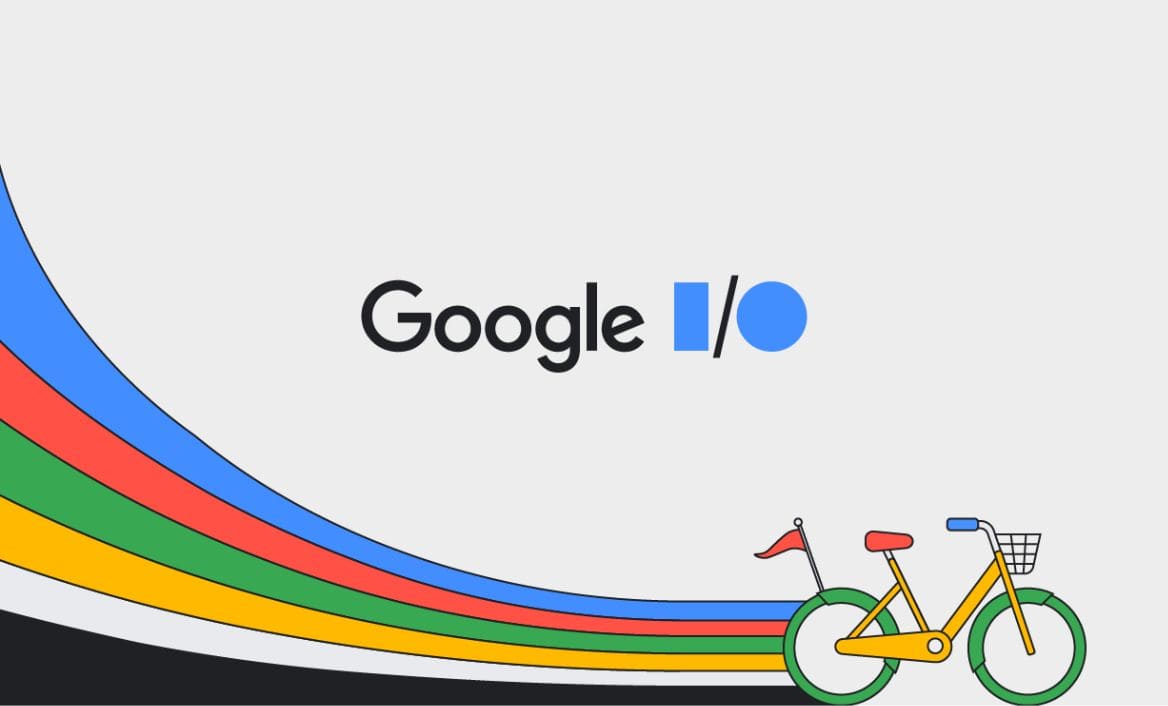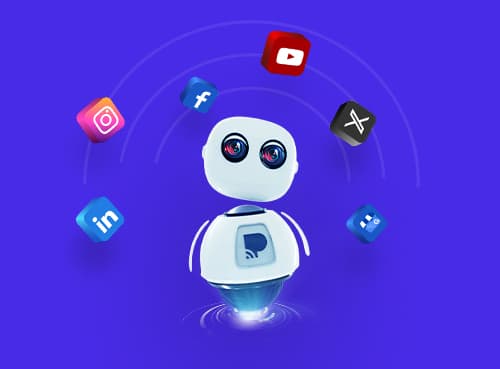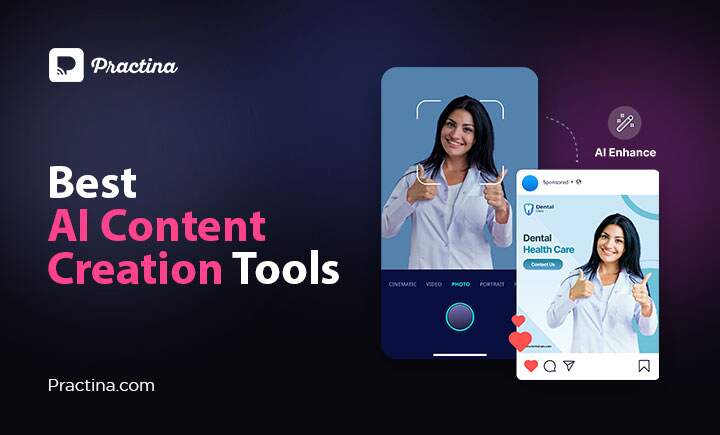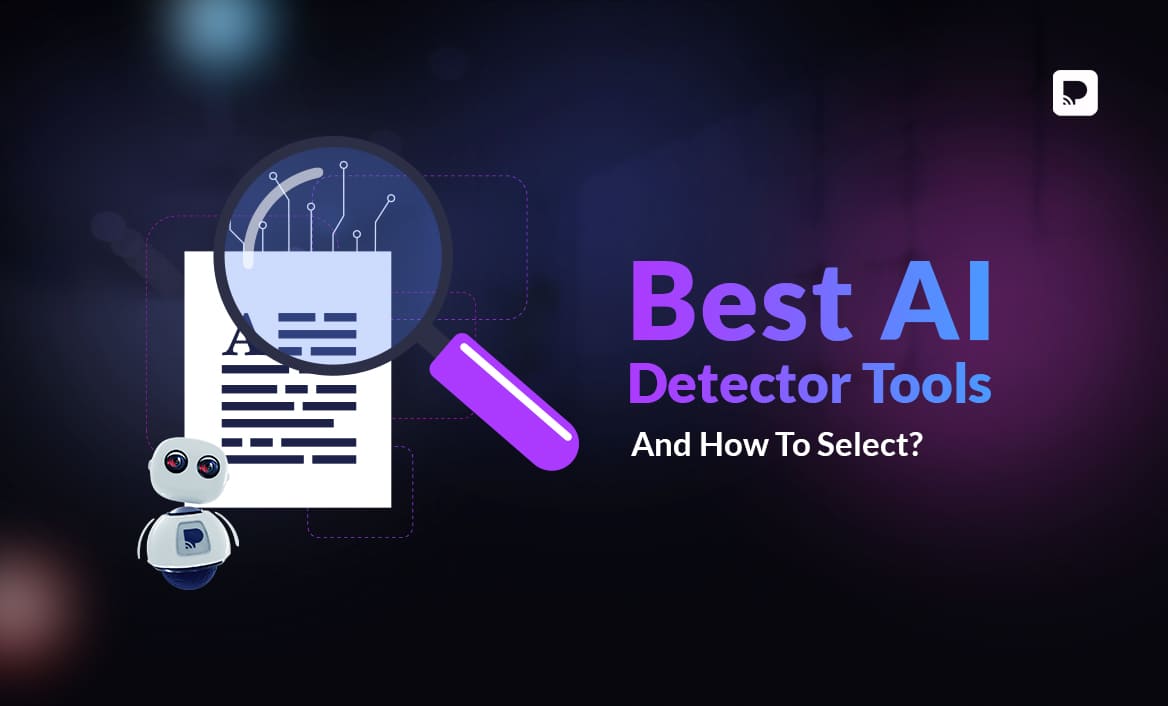Google I/O, one of the most highly anticipated technology events of the year unveiled a plethora of exciting advancements in the world of artificial intelligence (AI). This year’s keynote, delivered by Sundar Pichai, CEO of Google, highlighted the company’s commitment to making AI more useful and accessible to users worldwide.
The blog shares key highlights from Google I/O 2023, with a particular focus on the revolutionary concept of Google Search Generative Experience (SGE).
Gain insights into how AI is reshaping the digital marketing industry and its potential benefits.
Click to Learn MoreGoogle I/O 2023: Empowering AI for Everyone:
During the keynote address, Sundar Pichai emphasized the importance of democratizing AI and making it more beneficial for individuals, businesses, and society as a whole. Google I/O 2023 showcased a wide range of AI-driven innovations and updates that aim to enhance user experiences across various Google products and services.
Google Search Generative Experience (SGE):
One of the groundbreaking concepts introduced at Google I/O 2023 is the Google Search Generative Experience (SGE). SGE leverages the power of AI to create dynamic and interactive search experiences that go beyond traditional search results. By using generative models and deep learning techniques, Google aims to transform the way users interact with search queries and discover relevant information.
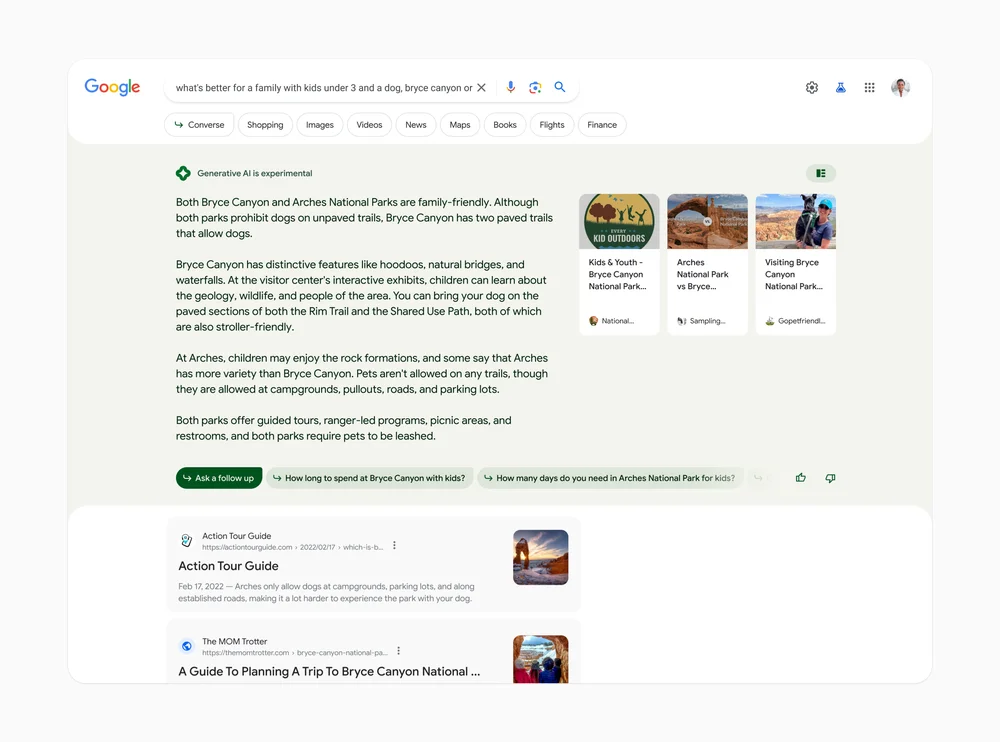
With SGE, users can expect
1. Rich and Immersive Search Results:
SGE takes search results to a new level of interactivity and depth. Users can explore information more engagingly and intuitively, with visually enhanced content, interactive elements, and personalized recommendations.
2. Conversational Search Experiences:
SGE enables conversational interactions with search results, allowing users to have more natural and fluid conversations with Google. This opens up new possibilities for voice-based search and makes it easier to find specific information or complete tasks through voice commands.
3. Context-Aware Suggestions:
Through AI-powered algorithms, SGE understands user intent and context, providing relevant suggestions that anticipate users’ needs. These intelligent suggestions help users discover related information, explore different perspectives, and dive deeper into topics of interest.
4. Personalization and Customization:
SGE tailors search experiences to individual users, taking into account their preferences, interests, and search history. By learning from user interactions, SGE delivers personalized recommendations, helping users find the most relevant and meaningful information.
5. Augmented Reality (AR) Integration:
SGE embraces the power of AR to provide immersive search experiences. Users can visualize information in their physical environment, such as trying on virtual products or exploring 3D models, bringing search results to life.
AI Expansion: Product Announcements at Google I/O 2023
Google clarified at the Google I/O 2023 conference that it is on its journey to be an ‘AI-first’ company. What does it mean? Google sees AI as a driving force of innovation across all its services and products. From enhancement in natural language processing (NLP) to the latest features in Google Workspace, Google has a lot to offer in 2023.
Duet AI for Google Workspace
With Google’s Duet AI, users can accelerate their work tremendously. Google has incorporated generative AI in Google Workspace so users can connect, create, and visualize their work like never before.
The new AI feature called ‘Help Me Write,’ extended to Google Workspace products, including Gmail, Docs, and Sheets, has taken productivity to the next level. It facilitates seamless collaboration and boosts user creativity.
Preview your Route in 3D on Google Maps
Google Maps will now provide personalized recommendations. Users will be able to get real-time public transit information and the weather forecast for the present day.
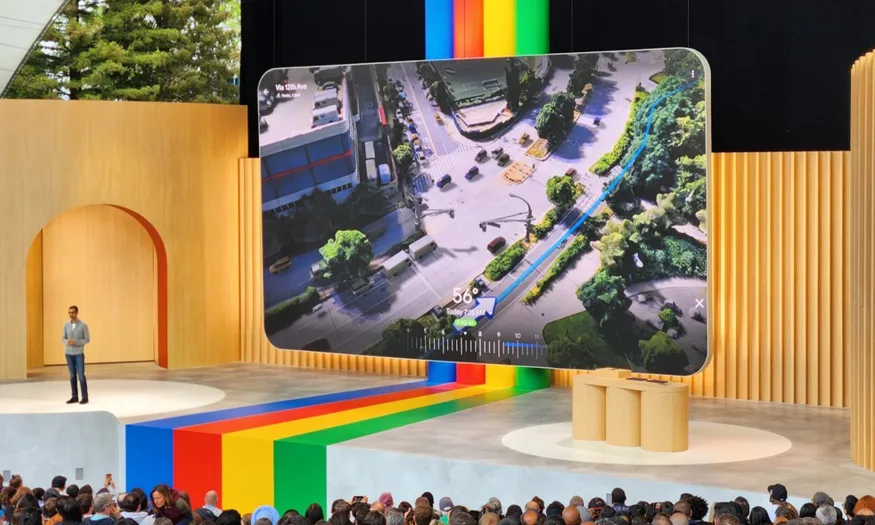
Furthermore, with Immersive View for Routes feature, Google will allow users to see the traffic on the searched route at a certain time. Google Maps will also provide AR-driven (Augmented Reality) navigation through its latest feature called ‘Live View Plus.
Google Photos’ Magic Editor
Magic Editor on Google Photos will allow users to edit photos using AI-based suggestions on their preferences. We are talking Photoshop-level edits here. It’s not available just yet, but here’s what it can do.
With Magic Editor, users can remove unwanted things, change backgrounds, and reposition objects or people. It will adjust brightness, contrast, generate new pixels, and other settings to enhance the overall look of the photos.
However, the Magic Editor is still in the testing phase and will be launched ‘later this year,’ said Sundar Pichai, CEO of Google.
While nobody knows when it will be live for general users, try Practina AI. It’s an AI tool used to enhance images. All users have to do is use the Practina app, click pictures, and upload. Practina will not just enhance the images automatically but also create stunning posts and publish them.
Conversational AI Search Feature
Google has launched a new Conversational AI Search feature that will enhance the search results for users. They can now explore and discover things more creatively.
In this new search model, users can see suggested steps in the search results with links to decide what should they do next. Conversational AI leverages the power of AI-based algorithms to provide similar ideas, concepts, and images related to the user’s search query.
PaLM 2 Language Model
Pathway Language Model (PaLM 2) is Google’s new general-purpose, next-gen language model with enhanced multilingual, reasoning, and coding abilities.
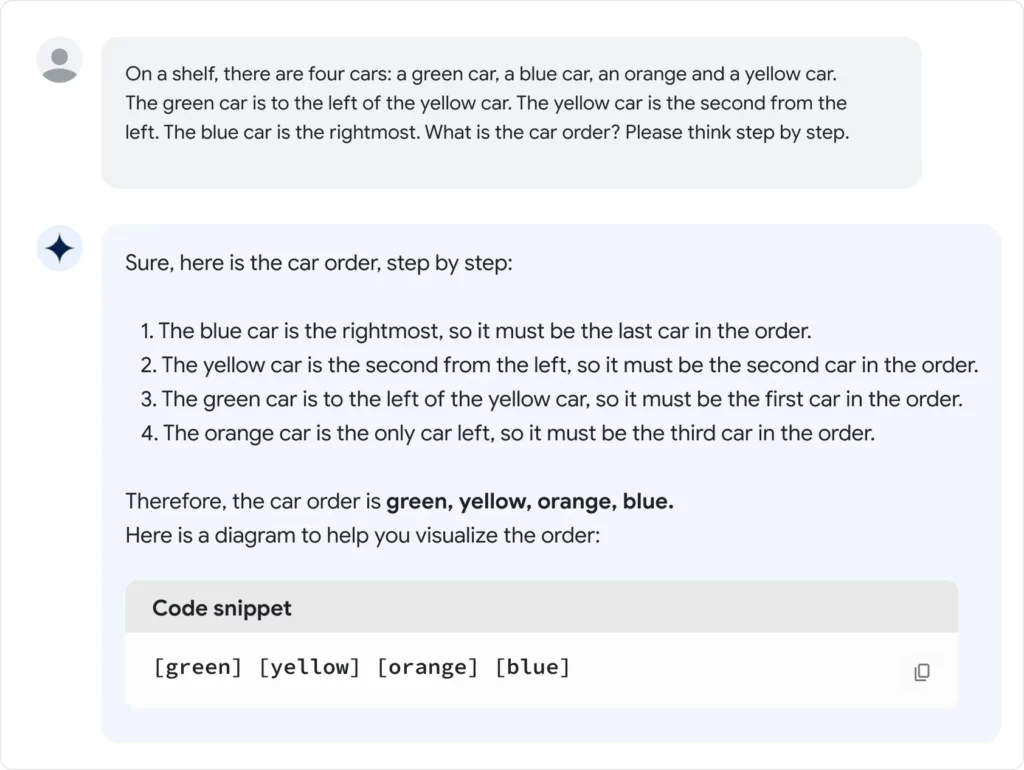
It utilizes unsupervised learning to refine natural language processing (NLP) tasks like sentiment analysis and text classification. PaLM 2 is powering several generative AI features and tools like PaLM API, MakerSuite, and Bard.
Generative AI for Google Cloud
Google has also introduced generative AI for Google Cloud to help cloud users with complex programming tasks. It includes code review, contextual code completion, and real-time function generation.
The users can experience generative AI across several Google Cloud products such as Google Cloud Console, IDE, and chat functions.
Moreover, Google has unveiled new foundation models for AI development, including Imagen for text-to-image conversions, Chirp for advanced speech recognition, and Codey for code generation. According to Thomas Kurian, Google’s Cloud chief, this new infrastructure can speed up the work by 80% and be 50% cheaper compared to its alternatives.
Updates to Bard AI-Language Model
Google Bard, a conversational AI, can produce natural-sounding responses to text inputs. The latest revisions have enhanced the model’s capacity to manage complicated talks spanning numerous themes.
Furthermore, it has improved to deliver more precise and instructive results. Bard can now recognize and react to user emotions and offer personalized responses according to the user’s state of mind.
However, experts at Google are still working on reducing the ambiguity and irrelevancy in Bard’s results. But there are many other software and tools available. Content generators like Practina can create fresh and interactive content for blogs, social media posts, ad copies, and so much more.
The Future of AI-Powered Search:
Google’s focus on making AI more useful through initiatives like SGE reflects a broader trend in the technology industry. As AI continues to evolve, it holds the potential to transform how we interact with information and navigate the digital landscape.
By leveraging the vast amount of data and powerful algorithms, AI-driven search experiences can provide more accurate, relevant, and personalized results. Users can save time, discover new insights, and make more informed decisions.
Exclusive White Papers
Knowledge at Your Fingertips: Explore Our Full Range of Research Materials!
Get Started Now!Conclusion:
Google I/O 2023 showcased Google’s dedication to advancing AI and making it more accessible and beneficial for users worldwide. The introduction of the Google Search Generative Experience (SGE) exemplifies the company’s commitment to revolutionizing the way we interact with search results.
With SGE, users can look forward to richer, more immersive, and personalized search experiences. The integration of AI, conversational interfaces, and augmented reality holds the potential to shape the future of search and make information discovery more intuitive and engaging.
As AI continues to progress, we can expect exciting advancements in the way we access and utilize information. Google’s focus on empowering AI for everyone demonstrates the transformative power of this technology and its potential to enhance our lives in countless ways.

